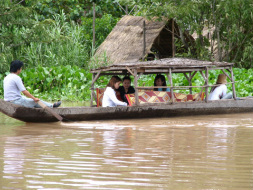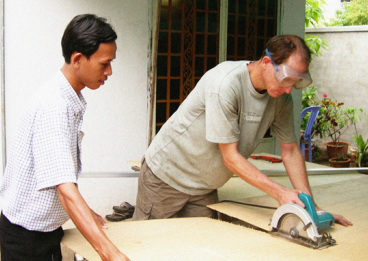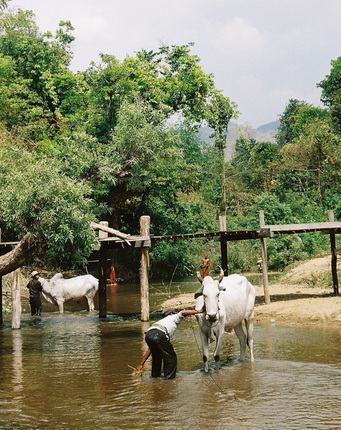Our Moto:
(Based on a Chinese proverb)
Give a person a fish and you feed them for a day.
Teach them how to fish and you feed them for a lifetime.
Support their faith and you feed them for eternity.
(Based on a Chinese proverb)
Give a person a fish and you feed them for a day.
Teach them how to fish and you feed them for a lifetime.
Support their faith and you feed them for eternity.
Give a person a fish and you feed them for a day

I am continually amazed at the wonderful work that so many people from all walks of life are doing in Cambodia. There is a non-government organisation (NGO) on ‘every corner’ throughout the country doing their bit to help their fellow human beings. However, in our desire to help, we must be very careful not to inadvertently patronise the people we are helping. We must give in a way that builds the skills and dignity of people.
Teach them how to fish and you feed them for a lifetime

A friend of mine was involved in many ‘fly-and-build’ trips to help with building projects overseas. As a young person, I admired the work he and his family did to help people. However, recently, my friend told me that he no longer believes in the ‘fly-and-give’ approach because it doesn’t provide long-term benefits.
Metaphorically speaking, it’s like building a house on sand. A large team flies in, puts up a building quickly and flies out again. The local people ‘have’ a new building but they don’t ‘own’ it. People get satisfaction from their achievements and the harder they have to work to achieve their goals, the more satisfaction they receive. Something I work to build, pay for, strive for and struggle over becomes ‘mine’ because so much of me is in it. And throughout the long journey of getting it I gain skills and learn from failures and successes.
Yes, the local people may help the fly-and-build team for a couple of weeks, but let’s face it, it’s a free gift. So the building soon starts to deteriorate. They lack motivation to maintain it because it was never ‘theirs’ and they lack the skills to repair it because they didn’t gain skills by building it themselves.
How do we help people without giving them a handout? How can we help people while still giving them a deep sense of achievement, satisfaction and pride? We find out what their dreams and aspirations are and we partner with them to help provide means (eg training, skills and some funds or methods for generating income) to go and build their own ‘buildings’ or whatever it is they want.
Metaphorically speaking, it’s like building a house on sand. A large team flies in, puts up a building quickly and flies out again. The local people ‘have’ a new building but they don’t ‘own’ it. People get satisfaction from their achievements and the harder they have to work to achieve their goals, the more satisfaction they receive. Something I work to build, pay for, strive for and struggle over becomes ‘mine’ because so much of me is in it. And throughout the long journey of getting it I gain skills and learn from failures and successes.
Yes, the local people may help the fly-and-build team for a couple of weeks, but let’s face it, it’s a free gift. So the building soon starts to deteriorate. They lack motivation to maintain it because it was never ‘theirs’ and they lack the skills to repair it because they didn’t gain skills by building it themselves.
How do we help people without giving them a handout? How can we help people while still giving them a deep sense of achievement, satisfaction and pride? We find out what their dreams and aspirations are and we partner with them to help provide means (eg training, skills and some funds or methods for generating income) to go and build their own ‘buildings’ or whatever it is they want.
Support their faith and you feed them for eternity

Health experts are now recognising the role that faith plays in a person’s health and wellbeing.1 As a nation, the Cambodian people have been through tremendous psychological and physical trauma. Unfortunately, as with their material needs, we are often in a hurry to ‘help’ people deal with trauma from our own cultural and religious perspective.
Faith is something that gives people a reason for their present hardships and hope for something better in the future and maybe even beyond this life. But to benefit from faith, it has to be ‘theirs’; they have to ‘own’ it.
During Pol Pot’s Communist regime, people were not allowed to openly practice their own faith. Buddhist monks were executed and pagodas destroyed. Muslim and Christian communities were persecuted. After the fall of Pol Pot, many people found comfort by returning to Buddhism or to the faith of their upbringing. With the opening of its borders and the influx of people from all over the world, many Cambodians have also searched out new ‘foreign’ religions and have adopted new faiths. The Cambodian people have always been tolerant and welcoming of other religious beliefs. But a person’s faith does not necessarily have to be associated with any particular religion and every person’s faith is unique.
Being a Seventh-day Adventist Christian organisation, Jomnin encourages faith, especially from a Christian perspective, while at the same time recognising that faith has to be a personal choice. More broadly, Jomnin is focused on what Seventh-day Adventists are perhaps best known for, and that is promoting health in the community.2
We support and encourage the development of skills so that people can live healthier lives and promote health in the community through healthy food, health services, and a healthy lifestyle which includes a healthy diet, adequate rest and sleep and, of course, faith!
Faith is something that gives people a reason for their present hardships and hope for something better in the future and maybe even beyond this life. But to benefit from faith, it has to be ‘theirs’; they have to ‘own’ it.
During Pol Pot’s Communist regime, people were not allowed to openly practice their own faith. Buddhist monks were executed and pagodas destroyed. Muslim and Christian communities were persecuted. After the fall of Pol Pot, many people found comfort by returning to Buddhism or to the faith of their upbringing. With the opening of its borders and the influx of people from all over the world, many Cambodians have also searched out new ‘foreign’ religions and have adopted new faiths. The Cambodian people have always been tolerant and welcoming of other religious beliefs. But a person’s faith does not necessarily have to be associated with any particular religion and every person’s faith is unique.
Being a Seventh-day Adventist Christian organisation, Jomnin encourages faith, especially from a Christian perspective, while at the same time recognising that faith has to be a personal choice. More broadly, Jomnin is focused on what Seventh-day Adventists are perhaps best known for, and that is promoting health in the community.2
We support and encourage the development of skills so that people can live healthier lives and promote health in the community through healthy food, health services, and a healthy lifestyle which includes a healthy diet, adequate rest and sleep and, of course, faith!
1. Perry, B. G. F. (1998). The relationship between faith and well-being. Journal of Religion and Health 37(2), 125-136.
Francis, L. J., & Kaldor, P. (2002). The relationahip between psychological well-being and Christian faith and practice in an Australian population sample. Journal for the Scientific Study of Religion. 41(1), 179-184.
2. Buettner, D. (2006). The secrets of long life. National Geographic. Retrieved from http://ngm.nationalgeographic.com/2005/11/longevity-secrets/buettner-text
Adventist companies promoting health in the community include Sanitarium Health Food Company, Loma Linda University and the Sydney Adventist Hospital.
Francis, L. J., & Kaldor, P. (2002). The relationahip between psychological well-being and Christian faith and practice in an Australian population sample. Journal for the Scientific Study of Religion. 41(1), 179-184.
2. Buettner, D. (2006). The secrets of long life. National Geographic. Retrieved from http://ngm.nationalgeographic.com/2005/11/longevity-secrets/buettner-text
Adventist companies promoting health in the community include Sanitarium Health Food Company, Loma Linda University and the Sydney Adventist Hospital.
